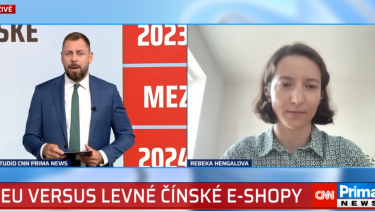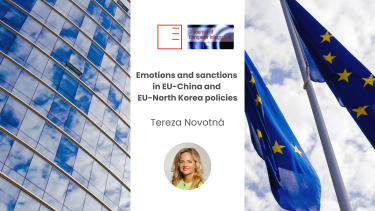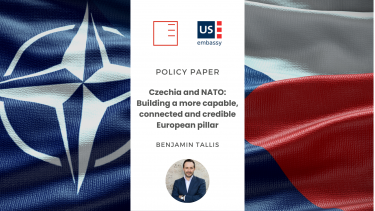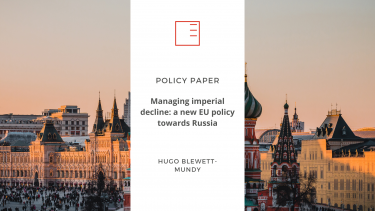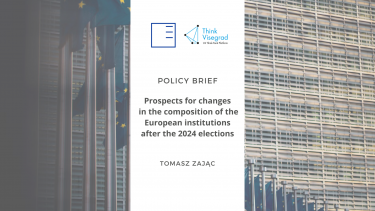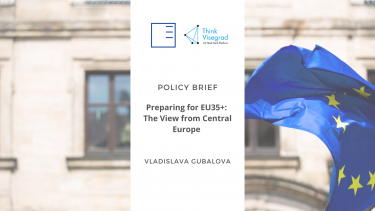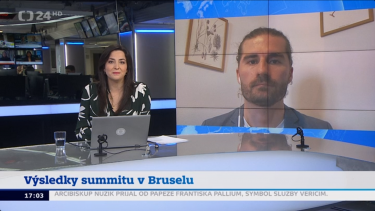CNN Prima News | New EU tariff policy targets ultra-cheap Chinese e-shops
The European Commission plans to abolish the current exemption from customs duties on cheap goods from Chinese e-shops. Until now, a 150-euro limit has applied to parcels from outside the EU. The forthcoming amendment is part of a package that aims to simplify and digitalize EU customs policy. In an interview with CNN Prima News, EUROPEUM Institute researcher Rebecca Hengal spoke about the issue.
Show moreJournal of European Integration | Emotions and sanctions in EU-China and EU-North Korea policies
Tereza Novotná, an Associate Research Fellow at the EUROPEUM Institute, explores the emotional dimensions of EU foreign policy in her article for the Journal of European Integration. The analysis examines how emotional factors shape political decisions and responses regarding EU human rights sanctions against China and North Korea, highlighting differing outcomes in these cases and suggesting that incorporating emotional awareness could enhance policy effectiveness.
Show more
STVR | Boycott of the Hungarian Presidency in Council of the EU
Most European Union states have decided to boycott the Council meeting in Budapest. This decision is a reaction to Orbán's "peace mission", during which he met with Russian President Putin, Chinese President Xi Jinping, and former US President Trump under the banner of the Hungarian presidency without any mandate from the EU. Will EU criticism slow Orbán down in his next steps? Can Hungary's presidency be revoked? Does EU foreign policy even need to be unified? The situation is commented on by Viktor Daněk, Deputy Director of EUROPEUM Institute.
Show moreČT24 | Von der Leyen re-elected as president of the European Commission
Ursula von der Leyen has retained her position as President of the European Commission. She received a total of 401 votes, significantly exceeding the required majority of 361 votes. The result was not as close as expected. What ultimately helped her achieve victory? And how difficult was it for her to negotiate support? Deputy Director and Head of the Brussels Office of EUROPEUM Institute, Žiga Faktor, commented for ČT24.
Show more
Policy paper | Czechia and NATO: Building a more capable, connected and credible European pillar
CEE allies are key to building the capabilities-based, European Pillar NATO needs to enact genuine burden shifting and secure the alliance’s future. Dr Benjamin Tallis shows how Czechia can build on recent progress in defense procurement and increase its influence by prioritising the six elements Euro-NATO needs: core national war-fighting capabilities, logistics, military mobility, strategic enablers, air defence and long-range strategic strike.
Show morePolicy paper | Managing imperial decline: a new EU policy towards Russia
Russia's full-scale invasion of Ukraine in February 2022 has shattered the post-Cold War international order built upon East-West interdependence and cooperation. The European Union (EU) - which had tried to pursue a strategic relationship with Russia after the collapse of the Soviet Union in 1991 - must now adapt to the geopolitical reality of Russian neo-revisionism. Hugo Blewett-Mundy, an Associate Research Fellow at EUROPEUM Institute, identifies four areas where the EU's policy towards Russia could evolve to confront this emerging security situation in Europe.
Show morePolicy Brief | Prospects for changes in the composition of the European institutions after the 2024 elections
This policy brief analyses the prospective changes in the European Parliament (EP) composition following the 2024 elections. It reflects on the evolving political environment since 2019, highlighting shifts in party dynamics within the EP, such as the fragmentation of traditional party dominance and the emergence of new political alignments. Additionally, it explores potential reconfigurations in top EU positions post-elections and examines ongoing concerns regarding geographical representation within EU institutions, particularly the European Commission. Writes Tomasz Zając from the Polish Institute of International Affairs (PISM).
Show morePolicy Brief | Vyhlídky na změny ve složení evropských institucí po volbách v roce 2024
Publikace analyzuje možné změny ve složení Evropského parlamentu po volbách v roce 2024, zamýšlí se nad vývojem politického prostředí od roku 2019 a poukazuje na posuny ve stranické dynamice, jako je roztříštění tradiční stranické dominance a vznik nových politických uskupení. Kromě toho zkoumá možné změny v obsazení vrcholných pozic v EU po volbách a zabývá se přetrvávajícími obavami ohledně geografického zastoupení v institucích EU, zejména v Evropské komisi. Píše Tomasz Zając z Polského institutu mezinárodních vztahů (PISM).
Show morePolicy Brief | Preparing for EU35+: The View from Central Europe
Despite the historical support of EU enlargement policy by the Visegrad Four (V4), these Central European states are now faced with the challenge of reconciling their stances with the new realities of the process. As Ukraine and Moldova opened their accession negotiations, the EU seems to be torn on the questions associated with the future enlargement(s) - institutional reforms and changes within the EU budget. Transitioning from economic beneficiaries to potential contributors, the V4 states must evaluate the potential political and economic impacts of new members on both the EU and their domestic levels. Writes and proposes recommendations Vladislava Gubalova from GLOBSEC.
Show moreČT24 | Who will get the top jobs in the European Union?
EU leaders nominate Ursula von der Leyen to lead the European Commission again. Estonian Prime Minister Kaja Kallas, known for her support for Ukraine, is to lead EU's foreign policy. Both women have yet to be confirmed in top jobs by the European Parliament. In addition to the majority, support may also have to be sought from the conservatives or the Greens. Viktor Daněk, deputy director of EUROPEUM Institute, comments for ČT24.
Show moreStaroměstské náměstí 4/1
Prague 1 - Staré Město
110 00
tel.: +420 212 246 552
email: europeum@europeum.org
https://www.europeum.org
